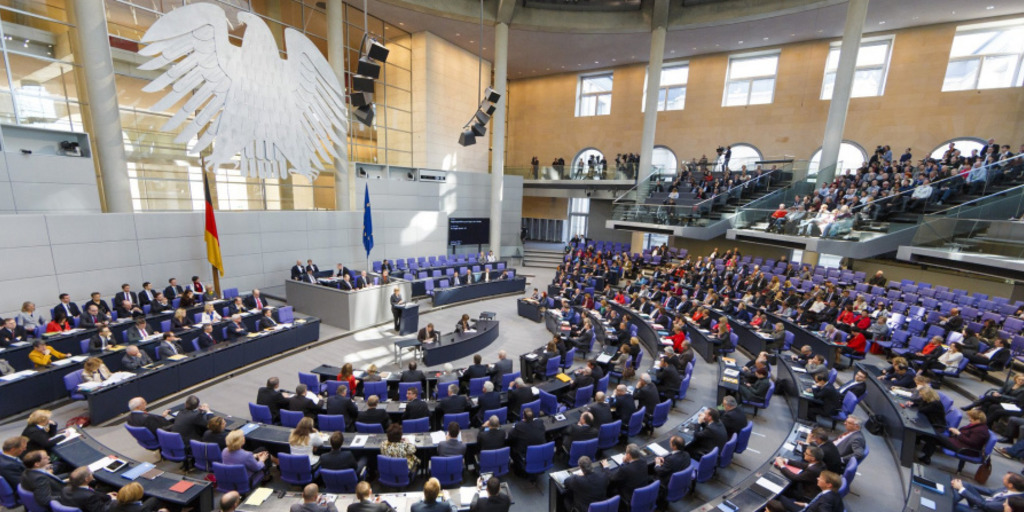When the UK's House of Commons sounds the bell for its weekly Prime Minister's Questions (PMQs), even the pubs in London change the channel on their TVs – from football to politics. There, at noon sharp every Wednesday, begins a verbal exchange between the government and the opposition that is unique in the world: Members of parliament ask the prime minister questions about current issues. And that usually triggers fierce exchanges.
Representatives of German citizens also ask the government questions in the Bundestag – in fact, there were almost 30,000 of them in the most recent legislative period alone. But hardly any voters have taken notice of this. According to a recent survey conducted by the Bertelsmann Stiftung, only one in four citizens can recall concrete details about a recent debate in the Bundestag – although this figure was twice as high just seven years ago.
DAX Companies Receive More Media Attention
This is also reflected in media coverage. According to the Bertelsmann Stiftung's tally, over the last 12 months, there were only 275 articles on Bundestag debates in Germany's leading media outlets – ranging from the Frankfurter Allgemeine Zeitung to Spiegel Online. Compared to 2007, this is a 41 percent drop. In contrast, there were twice as many reports about the PMQs in the UK’s most important media sources.
The Bundestag's status vis-à-vis other institutions can also be seen from a purely domestic comparison: There is also much more coverage of important companies on Germany's DAX blue-chip stock market index, such as Deutsche Bank or Siemens, than there is of all the debates in the Bundestag combined.
Both citizens and parliamentarians should be extremely concerned about this finding. The fact is that opinion formation can only succeed in a democracy if there are debates with broad public participation. Although it has gone widely unnoticed by the public, the parties belonging to the ruling government coalition have reached a minimal compromise and agreed to make a minor reform of the Question Time (Fragestunde) in parliament: Beginning in 2015, all federal ministers are supposed to participate in Q&A sessions in the Bundestag for 60 minutes at least once a year. And, unlike previously, the questions can also be about current issues.
British Model Can't Be Transferred to Germany
This kind of (mini-)reform is unlikely to change much about the low level of public interest, and the new model also is not really appealing. So, what can be done? Copy the debates in the UK's House of Commons? Clear the ring every Wednesday in the Bundestag for an amusing battle of words between party bigwigs, such as CDU head and Chancellor Angela Merkel and Gregor Gysi, a key member of The Left (Die Linke)? Or perhaps even a suitable-for-TV midday talk show held in the plenary chamber beneath the German eagle?
Transferring this British tradition to Germany is neither feasible nor desirable, according to a systematic comparative analysis conducted by the Bertelsmann Stiftung. While the British parliamentary culture is based on a more competition-oriented, two-party system and a debating parliament, the Bundestag is based on a more consensus-oriented multiparty system with coalition governments as well as a working parliament. The study's authors, Dominik Hierlemann and Ulrich Sieberer, conclude that these two cultures cannot be mixed.
Instead of simply copying the British model, the Bertelsmann Stiftung therefore proposes a more far-reaching reform. The core elements of the proposed model are: holding regular sessions of questioning the chancellor, the vice-chancellor and the line ministers, in which members of parliament ask questions directly; and allowing not only questions on specific specialized issues, but also on all current political issues within the competence of the federal government, and not revealing the content of these questions beforehand. Instead of having prepared statements, the issues covered by the questions (and the answers to them) will remain unknown – and therefore more interesting – until the debates actually takes place. Speaking time would be narrowly limited. While questions could each last a minute, answers couldn’t exceed three minutes, and short follow-up questions would also be allowed.
Unlike under current rules, parliamentary groups would no longer designate questioners beforehand. Instead, all members of parliament – including "dissidents" – would have an equal opportunity to direct questions to the government. What’s more, the Bertelsmann Stiftung also proposes that instead of only allowing representatives to directly ask the government questions in the Bundestag, citizens should also be permitted to do so. In this way, 20 questions – whether submitted online or by mail – could be answered each week during the debate.
How should we evaluate these kinds of proposals? German citizens have viewed them favorably. A representative survey conducted by the Bertelsmann Stiftung found that 54 percent of respondents believed these proposals were "a good idea." But what do politicians think? This is a matter for the Bundestag to decide on, and its president could declare: "The debate has been opened. Now the members of parliament will make the final decision…"





